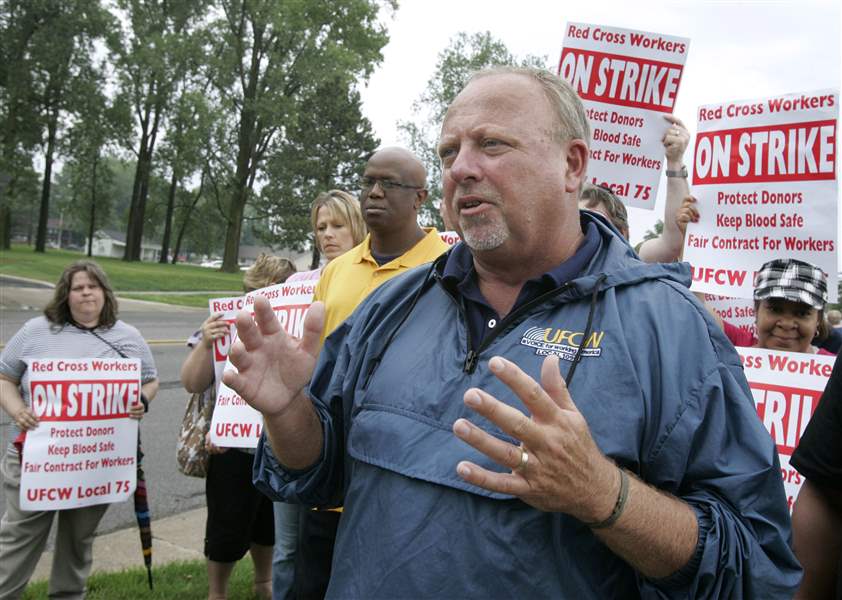
Blood-draw workers at regional Red Cross begin 3-day walkout
6/3/2010
Bill Dudley of Local 75 says strikers aren't disrupting blood donations but showing solidarity over stalled talks. They will return to work on Saturday, he said.
The Blade/Dave Zapotosky
Buy This Image
Workers who draw blood from donors for the American Red Cross in northwest Ohio and southeast Michigan began a three-day strike yesterday, citing lack of progress in labor talks.
The unusual work stoppage didn't disrupt any blood drives and Red Cross officials said they had no immediate worry about blood-supply shortages.
"We will be evaluating things on a day-by-day basis when we are up and operating again," said Karen Kelley, a spokesman for the Red Cross' Western Lake Erie region, at 3510 Executive Pkwy. in West Toledo.
"There is not any concern that anyone should have. We are committed to getting blood to any patient who needs it in northwest Ohio."
The striking workers are members of United Food and Commercial Workers Local 75. The union represents 184 hourly workers employed by the Western Lake Erie Region.
The strike was one of six coordinated walkouts yesterday by 1,200 workers with various unions at sites in six states where the Red Cross has blood-services offices and contracts have expired.
At issue is what the union called a lack of progress in negotiations to replace a contract that expired 13 months ago.
Bill Dudley, a Local 75 official, said the unionized workers have been asked to allow the employer to change its workers' medical benefits at any time, and that was unacceptable. Workers also are facing staff shortages and long hours, he added.

Bill Dudley of Local 75 says strikers aren't disrupting blood donations but showing solidarity over stalled talks. They will return to work on Saturday, he said.
"Our workers soundly rejected the Red Cross proposals because they were unfair," he said.
The local strike was to end tomorrow and was to "show solidarity" but not to disrupt blood donations critical to communities, Mr. Dudley said. The union workers would return to work Saturday, he said.
Bargaining is resume next Wednesday, he said.
Red Cross officials declined to discuss negotiations or bargaining issues but issued a statement that said, "While we will not discuss specific details of this situation, we can say the Red Cross put forward contract proposals consistent with the pay and benefits packages provided to our nonunion staffers, which were declined by the unions."
Affected is the blood-services operations for the Red Cross, which gathers donated blood from the public for use in various communities. It is separate from the Red Cross' disaster relief services.
Tedra White, a spokesman for ProMedica Health System in Toledo, said, "At this point, we're not concerned" about blood supplies. However, she added that the health-care provider would watch the situation carefully.
The local walkout began at 9 a.m. yesterday with pickets at the Western Lake Erie region headquarters, where 55 pickets showed up. Another 35 picketers were at a second Red Cross office at 1111 Research Drive.
Heidi Coutcher, one of the picketing workers, said, "Honestly, we didn't want to be out here. We just want things to change."
Another picketer, Dashiell Sims, said he was most concerned by the long hours and understaffing which has led to low morale and high turnover.
Mr. Sims said workers often work 12 to 14-hour days, sometimes do not get eight hours off between shifts, and often skip lunches and breaks. "It's hard working without enough people and the donors keep piling up on you," he said.
Dale Parker, a Local 75 official, said in the last three-year contract, which expired in April, 2009, workers received wage increases of 3 percent, 4 percent, and 4 percent. This time, the Red Cross is offering a one-year freeze and then increases of 2 percent and 2 percent.
Alisa Brown, one of the picketers, said the wage increases are too low. "I know [the Red Cross] isn't hurting," she said. "I love my job, don't get me wrong. But we can't take this."
The other strikes were taking place in Lansing, Mich.; Buffalo and Rochester, N.Y.; Johnstown, Pa., and Farmington, Conn.
Contact Jon Chavez at:
jchavez@theblade.com
or 419-724-6128.